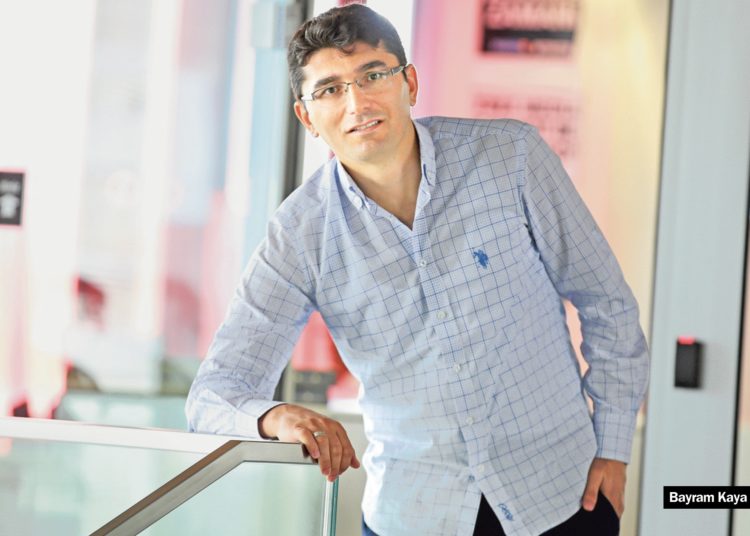Turkish investigative journalist and author Bayram Kaya, who exposed clandestine, dirty deals made by the Turkish intelligence agency under the unlawful orders of the government of President Recep Tayyip Erdoğan, has been jailed for 1,265 days as of today.
According to documents obtained by Nordic Monitor, the Turkish prosecutor listed his three books as evidence of terrorism in the indictment and asked for his conviction and up to 15 years’ imprisonment. The İstanbul 25th High Criminal Court convicted and sentenced him to six years, three months on charges of membership in a terrorist organization on March 8, 2018. The 2nd Criminal Chamber of the İstanbul Regional Court of Justice upheld the conviction in October 2018.
The jailing of 37-year-old Kaya and hundreds of other journalists is part of Erdoğan’s crackdown on critical voices in the media and his suppression of freedom of expression and speech.

Prosecutor Aydın Boztaş’s absurd claims in the indictment were accepted by presiding judge Taner Akıncı and panel members Özlem Atuk Çıldır and Akın Kavi, who ruled for the conviction and imprisonment of this top investigative journalist under case file No. 2017/67. The decision taken on March 8, 2018 was unanimous. The judges also ordered reimbursement of court costs from each journalist in the case and billed Kaya for 2,090.50 Turkish lira. Judge Akıncı was rewarded for locking up critical journalists and promoted to a regional appeals court in July 2018.

Kaya is a well-respected journalist among his colleagues and has broken many stories, especially on public safety, terrorism and national security issues. He was the first journalist to expose the involvement of state security elements in the murder of Armenian-Turkish journalist Hrant Dink, who was gunned down in 2007.
The prosecutor listed as evidence Kaya’s book “Kördüğüm” (Deadlock), a bestseller released in 2015 that lifted the veil on the murder of Armenian-Turkish journalist Dink. Kaya exposed how Turkey’s National Intelligence Organization (MİT) and other security elements affiliated with the Turkish military were involved in the planning and execution of the hit. The trigger man was caught, but the government did not go after the masterminds of the murder. The case is still pending.
In a major story in the Zaman daily on October 4, 2015 Kaya revealed that two MIT agents identified as Ö.Y., the deputy Istanbul regional director, and H.S. threatened Dink in the office of the Istanbul governor with the approval of then-Istanbul Governor Muammer Güler, who later became interior minister. The meeting was organized at the request of MIT.

Kaya concluded that the dark forces behind the murder, which he claimed was committed with the full knowledge of elements within state agencies, were not uncovered and that the Erdoğan government tried to pin the murder on the Gülen movement in 2014, after Erdoğan and the movement had a falling out. The book, based on government documents and interviews with sources, revealed shadowy elements nested in the Turkish security services, and the government was not happy about its publication.
Kaya wrote another book in 2014 titled “Babam Sağolsun” (Thank You, Dad) in which he revealed hitherto-unknown facts about Turkey’s biggest corruption investigations that incriminated cabinet ministers and President Erdoğan’s family members at the end of 2013. Kaya analyzed how ministers’ sons suddenly became wealthy businessmen after their fathers came to positions of power in the Erdoğan government. The prosecutor claimed Kaya had defamed Bilal Erdoğan, the president’s son, although Bilal is not a public official, illustrating the state of the rule of law in Turkey when a prosecutor tries to protect the reputation of a man because he is the son of the president.

The third book cited as evidence of terrorism by the prosecutor was “Sakıncalı Bürokratlar” (Unfavorable Bureaucrats), which he wrote in 2014 to expose Turkey’s long tradition of unlawful profiling of unsuspecting citizens by government agencies, victimizing thousands of writers, journalists, politicians, poets and clerics since the early years of the Turkish Republic. The documents he published showed the government had profiled 6 million citizens since the late 1990s and listed them as suspects without any judicial or administrative review because of their political views.

In addition to Kaya’s books, the prosecutor also listed two books written by other critical authors and sent to Kaya for review as evidence of terrorism. Tweets deemed critical of the government were also included in the indictment as evidence against him.
Like many journalists behind bars in Turkey, Kaya is also accused of membership in FETÖ, a supposed terrorist organization fabricated by the Erdoğan regime to persecute the civic Gülen movement. The evidence the public prosecutor presented in the indictment for the terrorism charges was Kaya’s three published books and his tweets.
A graduate of a journalism school, Kaya was educated in the UK and took various assignments for the Zaman daily, which was once the best-selling newspaper in Turkey. He worked in the business section in Istanbul and then moved to Ankara to cover law enforcement issues. He authored numerous lead stories and breaking news reports. On April 4, 2016 he was detained for two days over reports he published on the 2013 corruption investigation that targeted cabinet ministers and the Erdoğan family. He was later released. He was detained again on July 25, 2016 and subsequently arrested. He was put in İstanbul’s notorious Silivri Prison along with dozens of other journalists on July 30, 2016. He has been behind bars since then.

Turkey is the biggest jailer of journalists in the world. The most recent figures documented by the Stockholm Center for Freedom (SCF) show that 211 journalists and media workers were in jail as of March 2019. Detention warrants are outstanding for 168 journalists who live in exile or remain at large in Turkey.














